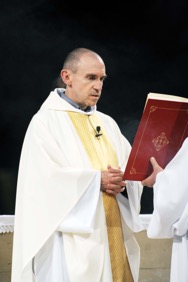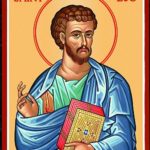This reading is a little unusual. Whereas most of the Old Testament prophecies speak about Christ in the third person, here we have Isaiah speaking the words of Christ Himself. One of the effects of this is to draw us into a deeper intimacy with Our Lord as He reveals Himself to us. The opening words invite us to listen showing that the initiative is the Lord’s – He wants us to know Him deeply. The more carefully we listen, the better we will get to know Him. One of the aspects of Saint Bernadette’s ecstacy at the Grotto before Our Blessed Mother was her attentive listening to what was revealed to her.

There are two references to Jesus present in the womb of His mother (verses 1 & 5) which point to His humanity. Many find it easier to accept Christ’s divinity than His humanity. Do I believe that Jesus was God in a human body or that He was mysteriously and uniquely both divine and human with two natures? It is more difficult to understand the depth of His suffering if we emphasise His divinity.
However Jesus was not unique in being called before He was born. At Lourdes Mary identified herself as The Immaculate Conception, chosen and formed for her mission from the moment of her conception. When we look carefully at the life and character of Saint Bernadette, do we not see a strong resemblance to Mary herself? Similarly, each one of us who is baptised was chosen before birth and has a unique mission and place in the Church. Do I accept who I am, my status, character? Do I accept where the Lord has planted me, my family, nationality? The Lord is reaching the ends of the earth (verse 6) through each one of us. Do I accept and even rejoice in the uniqueness of others, each with his or her specific contribution to the Church and the world, or would I prefer others to be more like me?
In His humanity, the Lord shares with us that He thought He had toiled in vain but afterwards comes to know that the Father was with Him through it all and appreciates Him (verses 3 & 4). How much faith does it take for me to believe that the Lord is with me not only in my successes but definitely in my failures too? To what extent are we able to assess what is success and what is failure? The Lord Jesus Christ is also with me in my death. We are not called to be successful but to persevere in belieiving that through all our trials we are in the shadow of His hand and concealed in His quiver (verse 2).

Lord, may I neither lose sight of Your humanity nor be lazy to search and reflect on the mystery of Your person by simply attributing what I cannot understand to your divinity. Lead me to know You ever more deeply. May I know that You are with me always – I leave You to judge my successes and failures.
Let us pray the Our Father, Hail Mary and Glory be.






